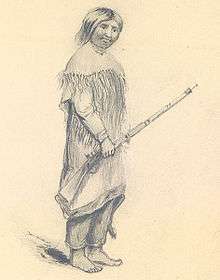Umpqua people

The Umpqua are any of several distinct groups (Lower Umpqua (Kuitsh), Upper Umpqua proper (Etnemitane) and Cow Creek Band of Upper Umpqua) of Native Americans that live in present-day south central Oregon in the United States.
Overview
The Upper Umpqua people included several different tribal entities. Languages spoken by the Upper Umpqua were Upper Umpqua (Etnemitane) language which is Athabascan language, Takelma language (Cow Creek dialect) and possibly Molalla language (spoken by few southern Molalla bands which were integrated in to the Upper Umpqua people) a Plateau Penutian language. The Upper Umpqua tribe is represented in modern times as one of The Confederated Tribes of the Grand Ronde Community of Oregon, one of The Confederated Tribes of Siletz Indians and as the Cow Creek Band of Umpqua Tribe of Indians. The tribe signed a treaty with the U.S. federal government on September 19, 1853. The Upper Umpqua was the first Oregon tribe to sign a federal treaty. The Cow Creek Band spoke the now-extinct Takelma language. The Cow Creek Band has a reservation near the modern-day city of Roseburg, Oregon.
The Kuitsh (often called Lower Umpqua or Kalawatset) "had their winter villages around Winchester Bay, at the mouth of the Umpqua River ... Kuitsh fishing camps were common up the Umpqua River as far as the modern town of Scottsburg ... In 1828, the Kuitsh attacked and wiped out the Jedediah Smith exploring party at the mouth of the Umpqua, leaving only 3 survivors ... The Kuitsh were deported north to a desolate reservation at Yachats in the 1850s, where they hung on in desperate conditions until 1875. [1]
The Lower Umpqua (Kuitsh) tribe is represented in modern times as one of the three Confederated Tribes of Coos, Lower Umpqua and Siuslaw Indians located on the southwest Oregon Pacific coast in the United States. They spoke Kuitsh dialect of Siuslaw language.
Some bands of the Umpqua are part of the Confederated Tribes of the Grand Ronde Community of Oregon.
The Cow Creek Tribe now operates the Seven Feathers Hotel & Casino Resort in Canyonville.
History
During the early 1800s, fur traders employed by the Hudson's Bay Company were the first non-natives encountered by the Umpqua and other Oregon native peoples. The Umpqua were less than tolerant of most of these intrusions. Their hostility culminated in the 1828 massacre of fifteen members of the American exploring party led by Jedediah Smith.
The Umpqua suffered mass mortality in the California smallpox epidemic of 1837-8, and from malaria and other diseases. They correctly blamed Euro-Americans for bringing these diseases, which only added to their aversion to all whites. The Hudson's Bay Company and the Russian authorities offered programs of vaccination against smallpox, but the Umpqua did not accept vaccination.[2]
Footnotes
- ↑ Macnaughtan, Don (2004). "Lane Community College Library - Bibliography of the Siuslaw and Kuitsh Indians of the Central Oregon Coast". Retrieved 2014-04-06.
- ↑ Robert T. Boyd, The Coming of the Spirit of Pestilence: Introduced Infectious Diseases and Population Decline among Northwest Coast Indians. page 132. Seattle, WA: University of Washington Press, 1999. accessed 20 November 2013.
Further reading
- Bakken, Lavola J. Land of the North Umpquas. Grants Pass, OR: Te-Cum-Tom Publications, 1973.
- Thoele, Mike. "She Keeps the Memory of Coastal Indians Alive." The Register-Guard, 8 May 1990: 3B. Profile of Florence, Oregon resident Marge Severy, last full-blooded member of the Kuitsh and Siuslaw.
- Macnaughtan, Don (2004). "Lane Community College Library - Bibliography of the Siuslaw and Kuitsh Indians of the Central Oregon Coast". Retrieved 2014-04-06.
External links
- Cow Creek Band of Umpqua Tribe of Indians homepage
- Confederated Tribes of Coos, Lower Umpqua, and Siuslaw homepage
- Coos, Lower Umpqua & Siuslaw Tribes profile
